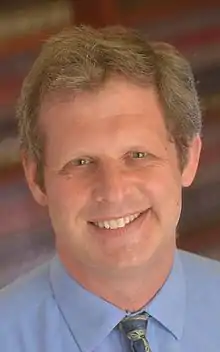The Volokh Conspiracy
The Volokh Conspiracy (/ˈvɑːlək/ VOL-ik)[1][2] is a blog co-founded in 2002 by law professor Eugene Volokh,[3] covering legal and political issues[4][5][6] from an ideological orientation it describes as "generally libertarian, conservative, centrist, or some mixture of these."[7]

Its name is a joking reference to Hillary Clinton's claim in 1998 of a "vast right-wing conspiracy" she believed was persecuting her and husband President Bill Clinton.[8] In 2007, Andy Guess of the Inside Higher Ed wrote that it was "one of the most widely read legal blogs in the United States" and that it "probably has more influence in the field – and more direct impact – than most law reviews."[3]
According to Adam Teicholz of The Atlantic, The Volokh Conspiracy, among other blogs, played an important role in influencing the view of Americans against the Patient Protection and Affordable Care Act.[9] In 2013, The Volokh Conspiracy appeared in ABA Journal's "Blawg 100 Hall of Fame".[10]
In January 2014, The Volokh Conspiracy migrated to The Washington Post,[10] with Volokh retaining full editorial control over its content.[11] After June 2014 the blog was behind a paywall.[10] In 2017, the blog moved to Reason, with Volokh citing as his reasons free access and editorial freedom to include unredacted expletives in quoted material.[12]
Notable contributors
- Eugene Volokh, UCLA School of Law professor, one of its founders
- Alexander "Sasha" Volokh, professor of law at Emory University School of Law, brother of Eugene Volokh
- Eugene Kontorovich, Antonin Scalia Law School professor
- Keith Whittington, William Nelson Cromwell Professor of Politics in the Department of Politics at Princeton University.
- David Hyman, professor of law at Georgetown University Law Center
- Jonathan H. Adler, professor of law at the Case Western Reserve University School of Law, who contributed under the pseudonym "Juan Non-Volokh" until May 1, 2006
- Kenneth Anderson, professor of law at American University
- Randy Barnett, professor of law at the Georgetown University Law Center
- Stuart Benjamin, Douglas B. Maggs Professor of Law and co-director of the Center for Innovation Policy at Duke Law School.
- David Bernstein, professor at the George Mason University School of Law
- Dale Carpenter, professor at the University of Minnesota Law School, and adjunct professor of law at William Mitchell College of Law
- Paul Cassell, professor of law at the S.J. Quinney College of Law at the University of Utah
- Tyler Cowen, professor of economics at George Mason University and at the Center for the Study of Public Choice and Director of the James Buchanan Center and the Mercatus Center (no longer a contributor)
- Clayton Cramer, a historian (no longer a contributor)
- Orin Kerr, professor of law at USC Gould School of Law, formerly of the George Washington University Law School
- David Kopel, research director of the Independence Institute and adjunct professor, University of Denver Sturm College of Law
- Jim Lindgren, professor of law at Northwestern University School of Law and director of their Demography of Diversity Project
- Eric Posner, professor of law at the University of Chicago Law School (no longer a contributor)
- Nicholas Quinn Rosenkranz, professor of law at the Georgetown University Law Center
- Ilya Somin, professor of law at George Mason University School of Law
- Todd Zywicki, professor of law at George Mason University School of Law
Articles are often posted by guest law professors who are not among the listed Conspirators.
References
- "Pronouncing 'Volokh'". The Volokh Conspiracy. May 27, 2009. Retrieved July 20, 2016.
- Sasha Volokh (July 20, 2016). "I'm finally attacked by name on the floor of the Senate". The Volokh Conspiracy. The Washington Post. Retrieved July 20, 2016.
[S]he pauses for a second or two in her notes, carefully considering how to pronounce my last name before settling on [ˈvoʊlɒk] (rhymes with 'bow lock') – I don't object to that pronunciation, even though we use [ˈvɑːlək] (rhymes with 'frolic') and the Russian pronunciation is [ˈvoləx]
- Andy Guess, "Blogs and Wikis and 3D, Oh My!", Inside Higher Ed, May 9, 2008.
- Cass R. Sunstein, Infotopia: how many minds produce knowledge, Oxford Univ Press (2006); ISBN 978-0-19-518928-5.
- James A. Durham, Deborah McMurray, eds., The lawyer's guide to marketing your practice, American Bar Association (2003) ISBN 978-1-59031-355-8.
- Daniel J. Solove, The future of reputation: gossip, rumor, and privacy on the Internet, Yale U Press (2007); ISBN 978-0-300-12498-9.
- "The Volokh Conspiracy: About". Volokh Conspiracy. Retrieved September 23, 2014.
- Rosenberg, Yair. "The Volokh Conspiracy Is Out To Get You". Tablet Magazine.
- Teicholz, Adam (March 28, 2012). "Did Bloggers Kill the Health Care Mandate?". theatlantic.com. Retrieved December 26, 2016.
- Mui, Sarah (January 24, 2014). "Volokh Conspiracy blog now subject to Washington Post's paywall Can lawyers use dynamic pricing?". ABA Journal. Retrieved January 28, 2014.
- Eugene Volokh (January 21, 2014). "In Brazil, you can always find the Amazon – in America, the Amazon finds you". washingtonpost.com. Retrieved December 26, 2016.
- Volokh, Eugene (December 13, 2017). "Our Move to (Paywall-free!) Reason from The Washington Post". The Volokh Conspiracy. Archived from the original on December 13, 2017. Retrieved December 14, 2017.